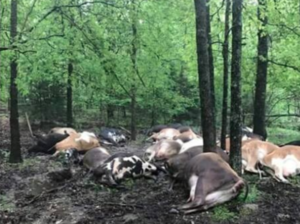Farmer finds pasture empty, sees all 32 de’ad cows in one big pile
The mood was serene as Jared Blackwelder and his spouse Misty tended to their dairy cows on a peaceful Saturday morning in Springfield, Missouri. Little did they know, this would mark their final encounter with the herd while they were still alive.
Despite recent flooding caused by heavy spring rains, it seemed like the worst was behind them. So, when Jared and Misty heard distant rumbling, they didn’t pay much heed, assuming it was just another routine sound of nature.

Until their evening milking, they let the small herd graze peacefully in the pasture. When they returned a few hours later, the Blackwelders were devastated.
Taking a walk across the deserted pasture, Blackwelder made a grim discovery—all 32 dairy cows lay dead, just beyond the edge of the trees. Lightning had struck the entire herd.
The Wright County Missouri Farm Bureau shared pictures of the dairy cows on their Facebook page, asking people to pray for the Blackwelders. “It’s a regular occurrence,” MFB President Stan Cody told CBS News. “It happens. What made this situation particularly devastating was the sheer number of animals affected.” Cody, himself a beef cattle farmer, has experienced losing a cow to lightning before. “You’re at the mercy of mother nature.”
A local veterinarian examined the cows and confirmed that lightning was the cause of death. He had never witnessed a lightning strike that killed more than six cows before. He believes the herd gathered under the trees seeking shelter from the storm.
Jared was utterly devastated. “They’re not like pets at all. But I’ve raised every single one of the ones I’m milking,” he told the Springfield News-Leader. “Because you handle dairy cattle twice a day, they’re a little different. It hits you pretty hard.”
Each dairy cow was valued between $2,000 to $2,500, totaling over $60,000 in projected losses for the Blackwelders. While they have insurance, they doubt it will be enough to cover such a significant loss.
Cody explained that the meat from the cows couldn’t be salvaged. “Those animals are damaged, and when he found them, they had obviously been there for a few hours,” he noted. “An animal has to go through a certain process to be processed. They wouldn’t have been fit for human consumption.”
The MFB has been in touch with local Farm Service Agency representatives. While losing a herd can spell disaster for a dairy farm, the FSA offers a Livestock Indemnity Program to help farmers recover from natural disasters like lightning strikes, flooding, or blizzards.
Some outsiders who are not part of the farming community have accused the Blackwelders of not providing adequate shelter. However, Cody swiftly came to their defense, pointing out that most Missouri farmers do not house their dairy or meat cows in separate structures. “He had no control over this,” Cody emphasized.






